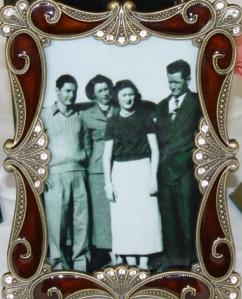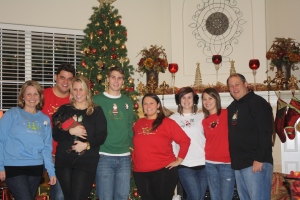 My grandmother’s house was a climate controlled storage unit. She held on to everything; thinking she might need it someday. She had a room added to her house and garage and lined them with shelves; filling it with things she might need. She worried what tomorrow might bring.
My grandmother’s house was a climate controlled storage unit. She held on to everything; thinking she might need it someday. She had a room added to her house and garage and lined them with shelves; filling it with things she might need. She worried what tomorrow might bring.
Older generations speak critically of the younger generation desire have now what it took previous generations decades to collect; wondering why they think they have to have bigger and better right now instead of waiting like they did in their time. The coming generation’s craving to acquire is the other side of the coin of outgoing generation’s addiction to save. The need to hoard and spend excessively grows out of the sense that enough is not enough. One either holds on to more than is needed or one tries to acquire more than needed. Both are symptoms of sinful anxiety that are rooted in the feeling there will not be enough to make me happy.
Jesus prohibits worry. The translation can’t be softened-“Stop worrying; speaking to us like a child about to touch a hot stove. Tell me to say stop worrying, I worry if I’m worrying. I can worry about a sermon on worry. The prohibition not worry is not unrealistic if we wrap our mind around some Lordly logic that comes with an three explanations and illustrations.
Jesus speaks of the secular trinity-what we eat, drink, and wear and forbids us to worry of these things. We find the divine logic in v. 25: Is not life more than food and the body more than clothing? He employs a classical pattern of argument; moving from higher to lower ideas. The higher idea; our life and body is more vital than the lower idea, what we put on it or in it. If God gives the greater gift of life and a body that sustains it, then we should not worry about the secular trinity, what we eat, drink, or wear. God’s greater gifts always include God’s lesser gifts.
Lordly logic means God doesn’t do things halfway. Mountains were given streams to shape it, snowflakes have the ground to absorb it, and a tree holds birds or squirrels to abide in it. God gave us eyes and ears and then blessed us with sight and sound to fill them. This Lordly logic gives reason to choose not to worry when we discover God’s greater gift of the Son includes endless lesser gifts from above.
These words say we will be fed, not feast. These words have nothing to do with whether we eat prime beef or hamburger or shop at Wal-mart or Neiman’s. He spoke these words to people whose stomachs were growling and whose mouths were often cotton mouthed with thirst. God’s greater gifts include lesser gifts means our needs will be met, not that our greed will be satisfied.
 Betty is a resident of the Island of Eleuthera and recently her 700 square foot house expanded to include nine persons in the household because of an unexpected death in her family. The people of FUMC, Irving were able to help her by putting up some partitions and redoing her bathroom. When the work was complete, she offered the usual thanks but she said something you might not expect. She said, “Your work gives me peace.” Her lesser concerns were addressed, but her greater concern was a higher need, a sense of real peace. Jesus follows the logic with illustrations that assure God’s greater gifts included God’s lesser gifts.
Betty is a resident of the Island of Eleuthera and recently her 700 square foot house expanded to include nine persons in the household because of an unexpected death in her family. The people of FUMC, Irving were able to help her by putting up some partitions and redoing her bathroom. When the work was complete, she offered the usual thanks but she said something you might not expect. She said, “Your work gives me peace.” Her lesser concerns were addressed, but her greater concern was a higher need, a sense of real peace. Jesus follows the logic with illustrations that assure God’s greater gifts included God’s lesser gifts.
Jesus follows the logic with illustrations that assure God’s greater gifts included God’s lesser gifts. Jesus points to the birds to prove worry is unnecessary. The birds are inferior to humans, they cannot sow, reap, or organize. It is a miracle how our feathered friends survive. God creates within them the instinct to find bushes that produce more than enough food without an ounce of worry or concern. Jesus didn’t say the birds didn’t work, he said they don’t worry.
The bee hummingbird is 2” long and weighs a few grams. It beats its wings 90 times a second. Every year, the bird flies from North America across the Gulf of Mexico to winter in Panama. Then, it miraculously returns to North America. If you believe that happens by chance, then believe an explosion in a printing company causes dictionaries to fall from the sky. 
Jesus points to us to prove worry is unavailing. He says “Who of you can add a cubit to your stature by worry?” He spoke those words to five foot tall Palestinians who looked up to their Roman captors. It can translate “Who of you by worrying can add an hour or day to your life? Were we anxious about birth when snuggled in our mom’s womb? Will anxiety decide when we meet our Maker: at a ripe old age or because of a premature accident.
Each of us has boundaries that worry cannot change. Zacheaus was short, Paul had a thorn, King David lost a child, and the woman at the well was married five times. These are only a few of the boundaries people face. I was born in Dallas, 1959, not London, 1859. I graduated from Baylor, not Yale. A widowed mother, not two parents, raised me. Those are boundaries I must accept. We all have boundaries we cannot change and acknowledge and accept that our worry is unavailing.
 Jesus points to the lilies of the field to prove worry is unbecoming. The Galilean lily is a wildflower that covers the hills. It is trampled underfoot and used as kindling for fires. The lily is inferior to birds and humans, yet it’s so finely arrayed that a microscopic inspection would reveal wonders to behold; making it finer than Solomon’s robe. If God would lavish flowers that are here today and in the oven by night, then how much more will God lavish us whose destiny is a life with God forever?
Jesus points to the lilies of the field to prove worry is unbecoming. The Galilean lily is a wildflower that covers the hills. It is trampled underfoot and used as kindling for fires. The lily is inferior to birds and humans, yet it’s so finely arrayed that a microscopic inspection would reveal wonders to behold; making it finer than Solomon’s robe. If God would lavish flowers that are here today and in the oven by night, then how much more will God lavish us whose destiny is a life with God forever?
God’s greater gift of saving grace always includes God’s lesser gifts of everyday grace. We wrestle with this divine logic that our relationship with God comes with God’s provision. Our anxieties belie this promise that we can trust the God of creation to give us bountiful gifts of creation.
Jesus practiced what he preached; walking each day never harried or hurried, but keeping his eye on what was ahead. Jesus had more to worry about than any other person who has lived. He didn’t know where he would lay his head at night; always dependent on somebody for something. He lived in the shadow of a cross. In the Garden he became concern of lesser things; praying, “Father, remove this cup.” Eventually he would pray: “Not my will but yours”, declaring the greater excludes the lesser.
We’re a child of God who can trust their heavenly Parent. At our baptism, we are adopted into the family of God. That trust comes from a inner compulsion, no amount of outer coercion can convince us not to worry. Only God’s Spirit can help us to choose not to worry and seeking first the kingdom of God and it’s righteousness. This verse helps us wrap our minds around the logic that God’s greater gifts include God’s lesser gifts.
An early aviator heard a rat chewing on the wires in the cockpit. He was over water and 2000 miles from land. He despaired; realizing it was gnawing at the vital parts of the aircraft. He ascended 2000 feet, and upon reaching higher altitude the noise ceased. When he landed, he found a dead rat in the plane’s pit that died in the higher altitude. We need to elevate ourselves so life’s gnawing concerns cannot pull us down. 
Jesus says, Do not worry about tomorrow, for tomorrow will bring worries of its own. Today’s trouble is enough for today. We’re to set aside distracting cares the future and fix our eyes on God who holds tomorrow. At the end of the day we’re to place confidence in God to provide what is necessary for the coming day. The nightfall is God’s iron wedge on the worries of yesterday and tomorrow concerns. Interest rates are prohibitive when borrowing troubles from tomorrow. Carrying the failures of yesterday into today breaks the back of anyone. Worries stay inside the wedge of today.
 A neurotic clock told the clock psychologists how hard it is to tick. He said, “Do you know I have to tick 2 times a second, 120 hundred and twenty times a minute, 7200 times an hour, and 17,280 times a day, 518,400 times a month, and 6,250,000 times a year.” The psychologist said, I know it is hard to tick, but how many ticks do you tick at a time. Like the clock we are to live one tick at a time and not be distracted about care for the future.
A neurotic clock told the clock psychologists how hard it is to tick. He said, “Do you know I have to tick 2 times a second, 120 hundred and twenty times a minute, 7200 times an hour, and 17,280 times a day, 518,400 times a month, and 6,250,000 times a year.” The psychologist said, I know it is hard to tick, but how many ticks do you tick at a time. Like the clock we are to live one tick at a time and not be distracted about care for the future.
Anxiety is a health problem that can remain undiagnosed and affect every dimension of our lives. It can happen to any person of any generation. It can even happen in the land of “No Problem”. The remedy to worry is to focus on the kingdom of God, higher and holier concerns, and trust our lesser concerns the secular trinity will diminish. It is our choice.




